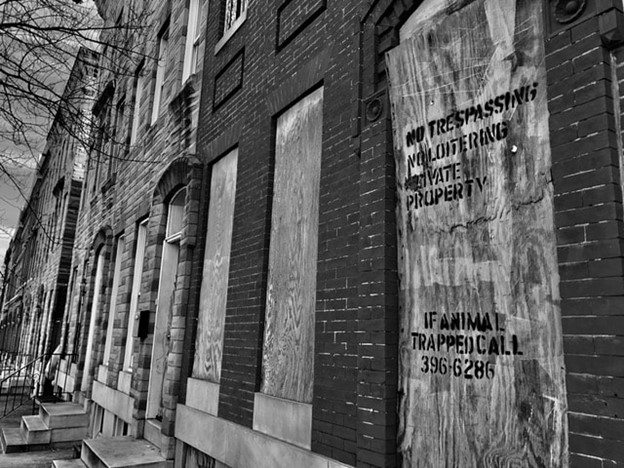
The doors and windows are clogged. MONICA G. PRIETO
Caught in 'The Wire'
Originally published in La Marea
BALTIMORE (MARYLAND). On the streets of West Baltimore, heartless and deserted except for some beggars, smugglers and trapicheo customers, street gangs walk around with brazen impunity. Brand new cream-colored cars with low windows reveal men with tattooed faces defying the red of traffic lights, earrings from their phones, on their way to the next commission. In a corner, a young woman runs after a man sneaking off a fence. "Are you trying to put drugs on my cousin, you son of a bitch? You're going to find out! You mess with mine, and I mess with yours!"
The atmosphere in Baltimore is unsettling and heartbreaking, but Syrian Khaled Heeba didn't know that when he arrived with his elderly parents three years ago, thinking he was leaving the hell of war behind and finally finding the security that would allow him to build a future. He survived the conflict in his native Damascus for three long years before fleeing to safety. He crossed the border to Egypt, where he worked 14 hours a day to support his family, waiting for the refugee resettlement program to assign him a destination.
On the day he was told he had been admitted to the United States, he thought his bad luck was over: he could be reunited with his paternal family, who ran a pizza place in Baltimore City. "He came with all his enthusiasm,"explains his cousin Mansoor, 19, inside Vizzini's Pizza, in a baking break. "He learned English from scratch, worked tirelessly, everyone appreciated him."
On 7 February, he remained in charge of three last outings before going to the mosque, where his family was waiting for him. "When we came back I wasn't here. The phone rings and he was the last customer, angry that his food hadn't arrived." Vizzini's team, accustomed to Baltimore's hell, had a heart freed. Khaled's father, uncle and sister came looking for him. When they saw three patrol cars around the delivery vehicle they knew it was too late.
"They saw his body lying in a pool of blood. Three agents had to hold my uncle to stop me from running towards him. Even today they continue to torment themselves with their fate, with Khaled's death and with the mistake they made settling in Baltimore,"articulates the young man.
The 31-year-old ironic death of Heeba does not defy Baltimore's cruel statistics, an icon of crime – with more deaths per capita than Mexico, Honduras and El Salvador – enshrined by masterful The Wire. The refugee's murder was just one of 335 registered in the city of 600,000 people last year,and, like the rest, the investigation is sterile.





